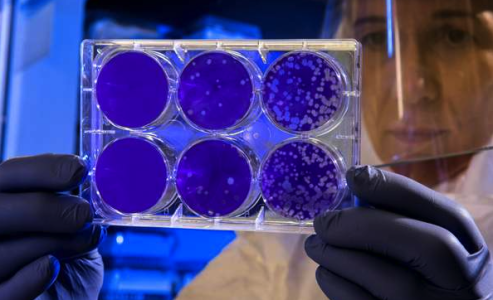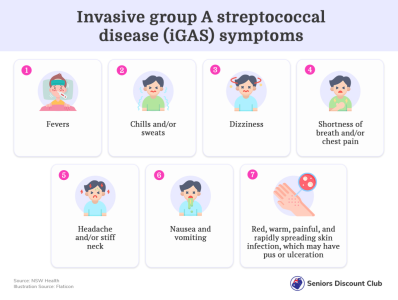Dangerous bacterial infections are on the rise. Here's what you should know
- Replies 4
It appears that there has been a recent surge in severe and invasive bacterial infections. While these are not as contagious as the coronavirus, it's crucial not to take these lightly.
This year alone, we've witnessed 28 cases of meningococcal disease and 544 cases of invasive group A Streptococcus (iGAS), and more is anticipated in the near future.
Dr Trevor Chan, the Clinical Director of the Emergency Care Institute at the Agency for Clinical Innovation, has warned about the potential dangers of these cases.
'It's very important the community is aware of the risks of these infections,' he said.
'While meningococcal (disease) and iGAS are rare, both can be very serious and cause death or permanent disability. Bacterial infections, like meningococcal and iGAS, can lead to sepsis, a life-threatening condition.'

According to the expert, the highest risk for meningococcal and iGAS diseases occurs during late winter and early spring. Recognising the signs and symptoms is crucial if we want to identify these infections before they become too serious.
Meningococcal disease can manifest with severe headaches, neck stiffness, sensitivity to bright lights, joint or limb pain, and an initial blotchy red or purple rash.
On the other hand, the signs of iGAS include a rapidly spreading skin infection that is red, warm, and painful, possibly resulting in ulcers or pus. These symptoms may be accompanied by fevers, chills, dizziness, shortness of breath, chest pains, nausea, vomiting, headaches, and a stiff neck.
In children, iGAS can resemble a rash similar to sunburn.
While still uncommon, the number of IGAS cases has increased over time. For instance, in Australia, the rate of this condition has risen from 3.7 cases per 100,000 children in 2018 to 5.2 cases per 100,000 children in the third quarter of 2022, according to a study published in the Lancet Regional Health.
In 2020, there were 23 cases of this condition in children, which increased to 107 cases in 2022. There's more to this story here in this article.
That's why Dr Chan stresses the importance of being aware of the symptoms and acts accordingly to get help should they develop.
'In the early stages, invasive bacterial infections can appear similar to more common viral illnesses. Occasionally, they can occur at the same time or follow a viral infection,' he said.
'We urge people to pay close attention to symptoms, trust their instincts, and seek urgent medical care if symptoms worsen or if they or the people they care for are getting worse.'
How does meningococcal disease spread?
Meningococcal bacteria are transmitted through secretions from the back of the nose and throat. Typically, close and prolonged contact is required for transmission from one person to another. Meningococcal bacteria do not survive well outside the human body.
According to the New South Wales Health Department, the disease is not easily spread by sharing food, drinks, or cigarettes.
Anyone who wants to protect themselves against meningococcal disease should talk to their doctor. You can check to see if you're vaccinated by viewing your immunisation history statement through Medicare.

You can prevent getting or spreading bacteria by frequently washing your hands with soap and water. Also, remember to keep wounds clean and covered until they heal.
Members, please take care and stay alert. If you know of anyone who may have been exposed to either of these illnesses, they must seek medical help immediately.
This year alone, we've witnessed 28 cases of meningococcal disease and 544 cases of invasive group A Streptococcus (iGAS), and more is anticipated in the near future.
Dr Trevor Chan, the Clinical Director of the Emergency Care Institute at the Agency for Clinical Innovation, has warned about the potential dangers of these cases.
'It's very important the community is aware of the risks of these infections,' he said.
'While meningococcal (disease) and iGAS are rare, both can be very serious and cause death or permanent disability. Bacterial infections, like meningococcal and iGAS, can lead to sepsis, a life-threatening condition.'

An increase in severe and invasive bacterial infections has prompted an urgent warning from health professionals. Credit: Unsplash.
According to the expert, the highest risk for meningococcal and iGAS diseases occurs during late winter and early spring. Recognising the signs and symptoms is crucial if we want to identify these infections before they become too serious.
Meningococcal disease can manifest with severe headaches, neck stiffness, sensitivity to bright lights, joint or limb pain, and an initial blotchy red or purple rash.
On the other hand, the signs of iGAS include a rapidly spreading skin infection that is red, warm, and painful, possibly resulting in ulcers or pus. These symptoms may be accompanied by fevers, chills, dizziness, shortness of breath, chest pains, nausea, vomiting, headaches, and a stiff neck.
In children, iGAS can resemble a rash similar to sunburn.
While still uncommon, the number of IGAS cases has increased over time. For instance, in Australia, the rate of this condition has risen from 3.7 cases per 100,000 children in 2018 to 5.2 cases per 100,000 children in the third quarter of 2022, according to a study published in the Lancet Regional Health.
In 2020, there were 23 cases of this condition in children, which increased to 107 cases in 2022. There's more to this story here in this article.
That's why Dr Chan stresses the importance of being aware of the symptoms and acts accordingly to get help should they develop.
'In the early stages, invasive bacterial infections can appear similar to more common viral illnesses. Occasionally, they can occur at the same time or follow a viral infection,' he said.
'We urge people to pay close attention to symptoms, trust their instincts, and seek urgent medical care if symptoms worsen or if they or the people they care for are getting worse.'
How does meningococcal disease spread?
Meningococcal bacteria are transmitted through secretions from the back of the nose and throat. Typically, close and prolonged contact is required for transmission from one person to another. Meningococcal bacteria do not survive well outside the human body.
According to the New South Wales Health Department, the disease is not easily spread by sharing food, drinks, or cigarettes.
Anyone who wants to protect themselves against meningococcal disease should talk to their doctor. You can check to see if you're vaccinated by viewing your immunisation history statement through Medicare.
Key Takeaways
- Severe and invasive bacterial infections are increasing, prompting urgent warnings from health professionals.
- Meningococcal disease and invasive group A Streptococcus (iGAS) can lead to sepsis, a life-threatening condition, and have been reported in an increasing number of cases.
- Symptoms of meningococcal disease and iGAS are varied and may appear similar to common viral illnesses; thus, health authorities are urging community members to be vigilant.
- Urgent medical care should be sought if symptoms worsen, even in the early stages of these infections, as intervention and treatment can be life-saving.
You can prevent getting or spreading bacteria by frequently washing your hands with soap and water. Also, remember to keep wounds clean and covered until they heal.
Members, please take care and stay alert. If you know of anyone who may have been exposed to either of these illnesses, they must seek medical help immediately.
Last edited by a moderator:









